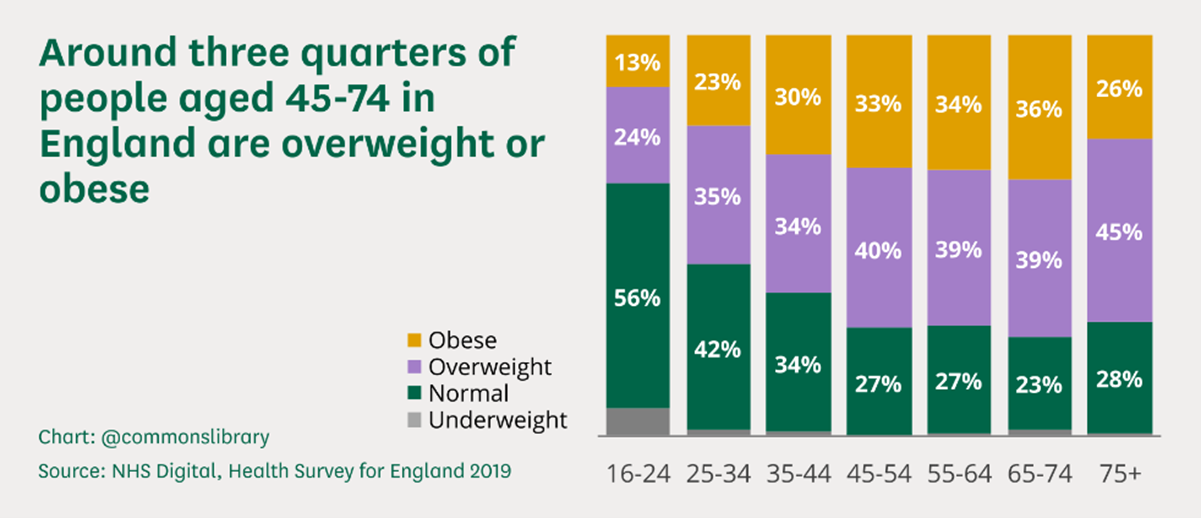Calorie Labelling - A Trap?
Disclaimer: The information below is based on my own experiences and observations; I am not a qualified nutritionist or healthcare professional. If you are struggling with obesity, eating disorders or mental health, you can find a list of useful links at the bottom of this article.
Have you ever felt guilty about having that extra slice of pizza or snacking between meals? Have you ever turned down a dinner with friends because you already had a big lunch and felt you had to somehow make up for it? Or have you found yourself turning to food for comfort? While we all may have had thoughts around food, calorie intake and exercise at some point, for someone suffering from an eating disorder, these thought patterns not only cause stress and anxiety, but also have severe health implications.
Since April 2022, restaurants with over 250 employees must provide calorie labels for food and soft drinks. Photo: William Reed Ltd.
In the UK, an estimated 1.25 million people suffer from an eating disorder. The NHS defines eating disorders as “a mental health condition where you use the control of food to cope with feelings and other situations”, which manifests itself in either eating too little or too much.
This article was prompted by the new regulation around calorie labelling on food menus, which the UK Government enforced in April 2022. This is deemed as a first step in tackling rising obesity levels and will be followed by a ban on free refills of sugary soft drinks. As I work in the hospitality industry, I could write about the difficulties of providing accurate calorie information for freshly prepared dishes, or the importance of offering low-calorie options to ensure customers are provided with a range of choices and revenues aren’t affected, but I believe the issue with this regulation runs beyond administrative challenges. Therefore, I’d like to use this post to raise awareness about how calorie labels could end up being a trap and cause more problems than they can solve.
Following the introduction of calorie labelling, I have noticed my own habits changing. I am now more inclined to opt for lower-calorie dishes and tend to skip dessert, but is this fostering a healthy attitude towards food? So, while the intention of this regulation, mandating calorie labelling for all restaurants, cafes, and takeaways with more than 250 employees, is to tackle rising obesity levels, I can’t stop wondering whether in the long-term this will cause more harm than good…
According to the Health Survey for England 2019, around one-third of people aged 35-74 in England are obese. The World Health Organisation (WHO) defines obesity as “abnormal or excessive fat accumulation that presents a risk to health”, essentially indicating there is an imbalance between calories ingested and calories expended.
So, this initially indicates that the government’s rationale to provide calorie information on food menus to educate the population on consumed calories is justified. But what about the remainder of the population? Are we running the risk of encouraging eating disorders, which are equally as hazardous to health?
A study on a similar initiative in the US, where a large fast-food franchise chain introduced calorie labelling to its menus, led to a calorie reduction of 4% per transaction in the first year. The impact of this decrease, however, faded during the course of the following year and didn’t have a long-lasting effect. This suggests that stigmatising calorie intake and weight isn’t effective when it comes to reducing obesity levels. In addition, calorie information doesn’t provide us any insight into the nutritional value of food items and dishes.
Rather than trying to solve one issue and thereby creating another, would it not be worthwhile to find a well-rounded approach that promotes a nutritious diet and active lifestyle? Food and health are so much more than merely calorie counting. BEAT – UK’s eating disorder charity – is raising awareness about eating disorders and provides support for those who are suffering from them. Know that there are people you can reach out to, if you feel that going to the restaurant, having dinner with your friends, or skipping a workout is making you feel anxious.
UK Support Organisations:
Beat Eating disorders (www.beateatingdisorders.org.uk) – 0808 801 0677 (England), 0808 801 0432 (Scotland), 0808 801 0433 (Wales), 0808 801 0434 (Northern Ireland)
National Centre for Eating Disorders (www.eating-disorders.org.uk) – 0845 838 2040
Obesity UK (www.obesityuk.org.uk)
Samaritans (www.samaritans.org) – 116 123
Author: Julia Huelser
Julia joined Hamilton Hotel Partners in July 2021 as an Analyst to support the team across all of Hamilton’s service lines.
Prior to joining, Julia acquired a thorough understanding of hotel operations through her role as Quality and Brand Manager at InterContinental London – The O2. She also gained valuable insight into revenue management, marketing & sales as well as meetings & events during her Graduate Management Trainee position with Arora Hotels.
Julia graduated with a MSc in International Hotel Management from the University of Surrey and a BA in Tourism Management from the University of Applied Sciences for Management & Communication (FHWien der WKW) in Vienna.



